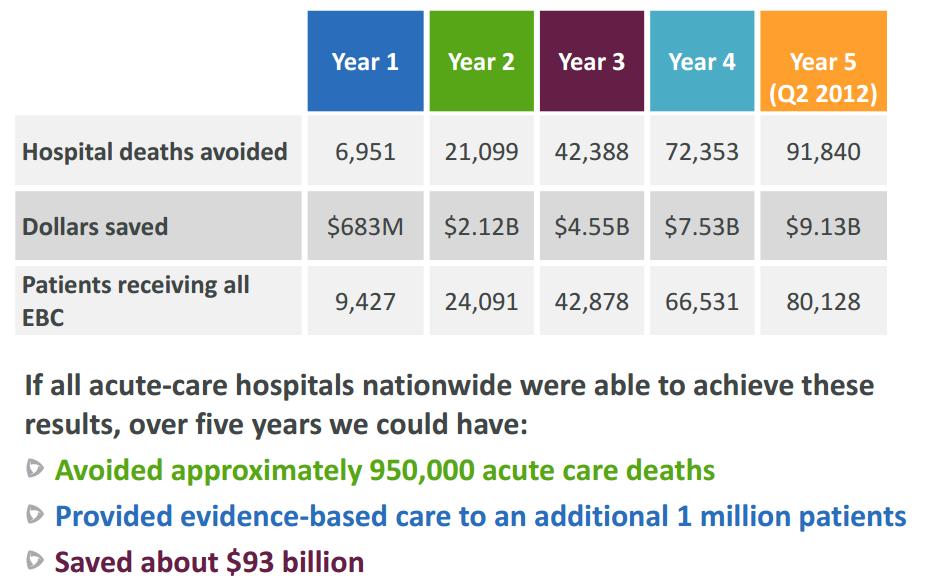QUEST Collaborative Year 4 Findings Released
Hospitals nationwide could save 950,000 lives and approximately $93 billion over five years by replicating practices achieved by a national performance improvement collaborative. These findings are based on four year results from members participating in an ongoing program with Premier healthcare alliance QUEST collaborative. The collaborative, which represents almost every state, including all hospitals in the state of Hawaii, aligns closely with federal policies such as value-based purchasing and the Partnership for Patients effort. Read and download the QUEST Year 4 Findings report.
The 333 participating hospitals set aggressive goals for rapid and sustained improvement; achieving excellence on a number of transparent measures; benchmarking performance against one another; and sharing knowledge to test and then scale strategies that improve the quality, safety and cost effectiveness of care. To reach these new standards of top performance, hospitals were challenged to:
- Reduce mortality at least 31 percent;
- Reduce the average cost of care to less than $5,690 per discharge;
- Reliably deliver all evidence-based care measures to patients in the areas of heart attack, heart failure, pneumonia and surgical care at least 95 percent of the time;
- Improve the hospital experience so that patients favorably rate their stay and would recommend the facility to others at least 73 percent of the time;
- Reduce preventable harm events; and
- Reduce readmissions by 12 percent.
Once standards are set based on the data, QUEST hospitals test concepts of change, monitor progress to the goals and transparently share best practices with one another. Process maps, checklists, standing orders and other effective ideas are then collected and housed in a social networking community for all Premier member hospitals and health systems to access. This supports performance improvement efforts and the spreading of best practices nationwide through education, coaching, and face-to-face learning.
QUEST standards of top performance can be adopted by any hospital in the country, and have been tested by participants of various sizes, geographies and teaching status, including disproportionate share and safety net facilities. In following these standards, other hospitals should be able to replicate the results of QUEST participants, which are outpacing national averages.
Complementing efforts to lower mortality, costs, harm and readmissions, QUEST members provide all recommended evidence-based care measures at least 96 percent of the time, a 14 percent improvement since 2008. This equates to 80,128 additional people receiving evidence-based care – more than the number of hospitalized Americans that die each year as a result of preventable medical errors.
At the same time QUEST hospitals have been improving their overall quality standards, they have also reduced the mean cost per discharge by $1,110, primarily by reducing costs for both labor and supplies by focusing on resource utilization, improved workflows and eliminating waste. As a result, QUEST hospitals’ costs are 14 percent lower than national averages, and have remained flat for the last three quarters.
Patient experience scores among QUEST hospitals have increased by 3 percent and they maintain a 1 percent edge over non-participants. Their readmission rates have declined modestly, dropping by 4 percent, a somewhat predictable result given that many facilities have just begun to work on this issue.
Despite overall improvements, there are areas where more can be done to improve healthcare across QUEST hospitals, the Premier alliance and the nation. The collaborative is going a step further with the next generation of QUEST, which will launch in January 2014, to continue to drive improvement on inpatient metrics that align with value-based purchasing and payment reductions and penalties, and to begin to enhance improvement on ambulatory and community health based metrics that will further help providers move to new models for delivering care.
For more information on the QUEST collaborative, visit their website.

